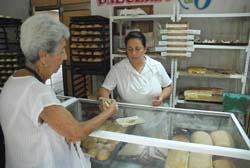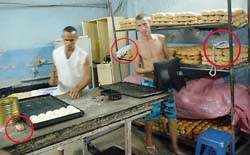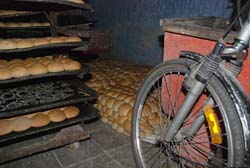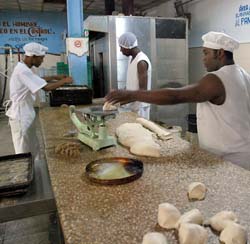
Havana, Wednesday, July 7, 2010. Year 14 / Number 189
That bread might be coming your way
By Yudy Castro Morales
We began our rounds at two in the morning and covered seven bakeries in six Havana municipalities in four hours, enough to witness anomalies likely to be, I regret to say, even more serious anywhere across Cuba.
 La
Espiga de Oro (The Golden Spike) stands out for its neatness and good
organization, both in the kitchen and the counter.
La
Espiga de Oro (The Golden Spike) stands out for its neatness and good
organization, both in the kitchen and the counter.Much as the assurance of getting a roll every day may be a unique privilege afforded to the Cubans, the State’s efforts to protect it have long been hogtied by quality problems in production.
If on top of the existing economic limitations we have to cope with a lack of both effective control mechanisms and due respect for the established manufacturing practices, then our daily bread ends up yielding more losses than benefits.
THE MARK OF INDISCIPLINE
Our first stopover was the bakery La Unión in Havana’s Guanabacoa municipality. As in others of its kind that we visited later in the day, the top management was nowhere around, and the warning lights were even brighter in bakeries like El Nogal, Buena Vista and El Bombero, all in different city municipalities, as not even the master bakers were in the premises.
 Judging
by the violations detected, the workers at the bakery El Bombero are
very slack.
Judging
by the violations detected, the workers at the bakery El Bombero are
very slack.
While some bakeries were almost empty of staff, others were too crowded. In Cerro municipality’s Los Ocujes, the presence of unauthorized personnel was another twist in the string of violations. That the hangers-on were up to something was anybody’s guess, but would you really put your head on the block for them?
Considering that these are food-producing centers, hygiene was very poor. Smoking seemed to be allowed; swarms of insects buzzed over lidless garbage cans; and bakeries like La Bolívar, Buena Vista and La Unión had better implement the most basic sanitation rules before they even think of calling pest control. For all the shortage of pallets and shelves, there’s no question that piling up bread rolls and loaves on the naked floor is not exactly a viable alternative to proper storage.
 Despite
the shortage of pallets and shelves, it’s unacceptable to store bread on
the floor!
Despite
the shortage of pallets and shelves, it’s unacceptable to store bread on
the floor!In Centro Habana municipality’s La Salud we found an employee sound asleep on a cot of sorts they had put up with the canvas used to cover the bread trays. Meanwhile, a cat, perhaps a patron, roamed freely in the kitchen.
Some blamed on the heat their decision to take off their kitchen outfits or leave them at home, in clear violation of the rules. Others poked big holes in Provincial Food Industry (EPIA) director Vicente Bárcenas’s assertion that every production worker received two sets of uniforms per year by saying they not always got theirs.
WEIGHT AND IMBALANCE
According to Vicente Bárcenas, Havana’s 238 bakeries make, usually by hand, 2.8 million bread units every single day, so there’s a chance for the commission of violations. However, under no circumstances should an item be on the market that fails to reach the required quality levels, as it so often happens.
A baker’s pound equals 400 grams, that is, five 80-gram rolls. And this is how the weigh the bread they make instead of doing it by the piece, points out EPIA deputy manager Yamina Montero, explaining that in order to appraise an output of over 3,000 units –less than the daily amount produced by each bakery in Havana– twenty weighing runs are made, of which up to five could be outliers. In other words, 100 units of bread are tested. The standard allows for up to 25 of them to be above or below the said weight without the lot being said to be defective or non-conforming.
 In
La Espiga de Oro, the staff is aware that using the scales as laid down
in the regulations brings down the number of violations.
In
La Espiga de Oro, the staff is aware that using the scales as laid down
in the regulations brings down the number of violations.
“Size is by no means a weight pointer, but smallness breeds doubt. Therefore, when we visited El Nogal and Buena Vista we insisted on weighing several rolls, and there you go, none had the right weight. Those rolls may have been among the permissible exceptions, but what’s certain is that in these bakeries the scales were just part of the decoration rather than working instruments.
Bárcenas claims that it’s the master baker’s responsibility to avoid such noncompliance.
But what if they’re AWOL, as we confirmed in some of the bakeries?
“Every unit has a Commission in charge of checking the bread rolls before they’re sold to our customers. They take out the defectives and resell them later on as toast or breadcrumbs to coat other foods.”
Now, if this method were really effective, why is it then that there are so many unhappy customers? And even if the Commission fulfills its obligations to the letter, how much bread gets lost along the way? And how many people have to wait until a later time or the following day to get their ration? How much was invested in producing something that never made it to the end of the line?
Quality control includes testing organoleptic characteristics like smell, taste and color, all of which depend largely on the raw material and on how much regard the employees have for the technical regulations.
Let’s take El Nogal’s case as an example: there we found a container full of dough prepared the day before, and they told us it would remain there until the following shift, that is, for another 12 hours.
Yamina Montero describes the procedure in greater detail: technically speaking, any “old dough” can be used up to 72 hours after it was made. Yet, it’s not right to wait until the next shift to bake it because the mixture could go sour. These alterations are probably the reason why our bread rolls have an acid taste to them sometimes.
Bárcenas holds that EPIA’s ears are never deaf to such breach of the regulations. "We have inspectors at several levels, and every day the Board of Directors pays surprise visits in three municipalities. Besides, we assess once a week the raw material used in any given territory while another is submitted to an audit. Until May we had reprimanded, demoted or withdrawn bonuses from 95 employees, and 68 others were dismissed". As soon as weight violations are detected, he adds, we replace the managers at once.
If that’s so, how many managers would have to be fired from bakeries throughout Havana? Penalties notwithstanding, there’s an urgent need for qualified, committed employees capable of forestalling any violation by themselves.
THE MASTER’S EYE MAKETH THE HORSE FAT
Many hide their incompetence behind an economic formula to make rationed bread that not always counts on the optimal resources. Others who use the same raw material strive to improve the offer and make it clear that the human factor does make a difference.
This may explain why quality is so different in any two bakeries of a same municipality located just a few blocks from each other, like El Nogal and La Espiga de Oro, both in Havana’s Vedado neighborhood. Whereas the former sells bread that customers label uneatable, the latter “delights” its own. And there’s no magic about it. A demanding manager like Mabel Villar and a motivated staff suffice to do the trick.
How do you manage to keep it going like that? “By sticking around and keeping an eye on things all the time, because the master’s eye…,” she answered decisively.
"When the raw material is not the best one, like right now, we mix the flour, make tests and, above all, prepare it with every ingredient in the book, without forgetting our own share of love,” remarks master baker Yodelkys Veranes.
It’s the staff’s responsibility to see to it that their workplace is clean and tidy and prevent the product from being unnecessarily mishandled. Thus they’d never have what we found in El Bombero: used clothes and a telephone lying on top of the bread rolls, the same ones which have generated everything from the harshest criticism to popular monologues by standup comedians.
INCENTIVES BY THE GRAM
Even if an aura of shadiness hangs over most bakeries, many workers have never jumped onto the embezzlement bandwagon that travels the breadth and length of the bread-making sector and choose to remain instead glued to the platform hoping for things to change somehow.
A high number of employees find it preposterous that their bonuses are basically contingent on whether they meet Havana’s production goals for the bread sold in the free market –which has made it possible to put more bread on our tables– while the rationed bread accounts for the largest volume of production.
Yamina Montero says that producing enough bread to keep the family shopping basket well provided comes first; then our bakeries can take care of their social and other commitments. The current salary scales are to blame perhaps for the trend in certain bakeries to boost bread production for the free market rather than meet their primary objective.
An analysis of this and other concerns, not to mention the difficulties caused by the use of two enterprises in charge of making bread –the other ones is the so-called Cadena Cubana– would surely help us deal with the never-ending questioning of quality and improve the negative image most Cubans have of our bakeries. It’s the only way to stop the criticism and start to appreciate the true value of a bread ration that, for all we know, might end up in your hands this very day.
http://www.granma.cubaweb.cu/2010/07/07/nacional/artic03.html
|